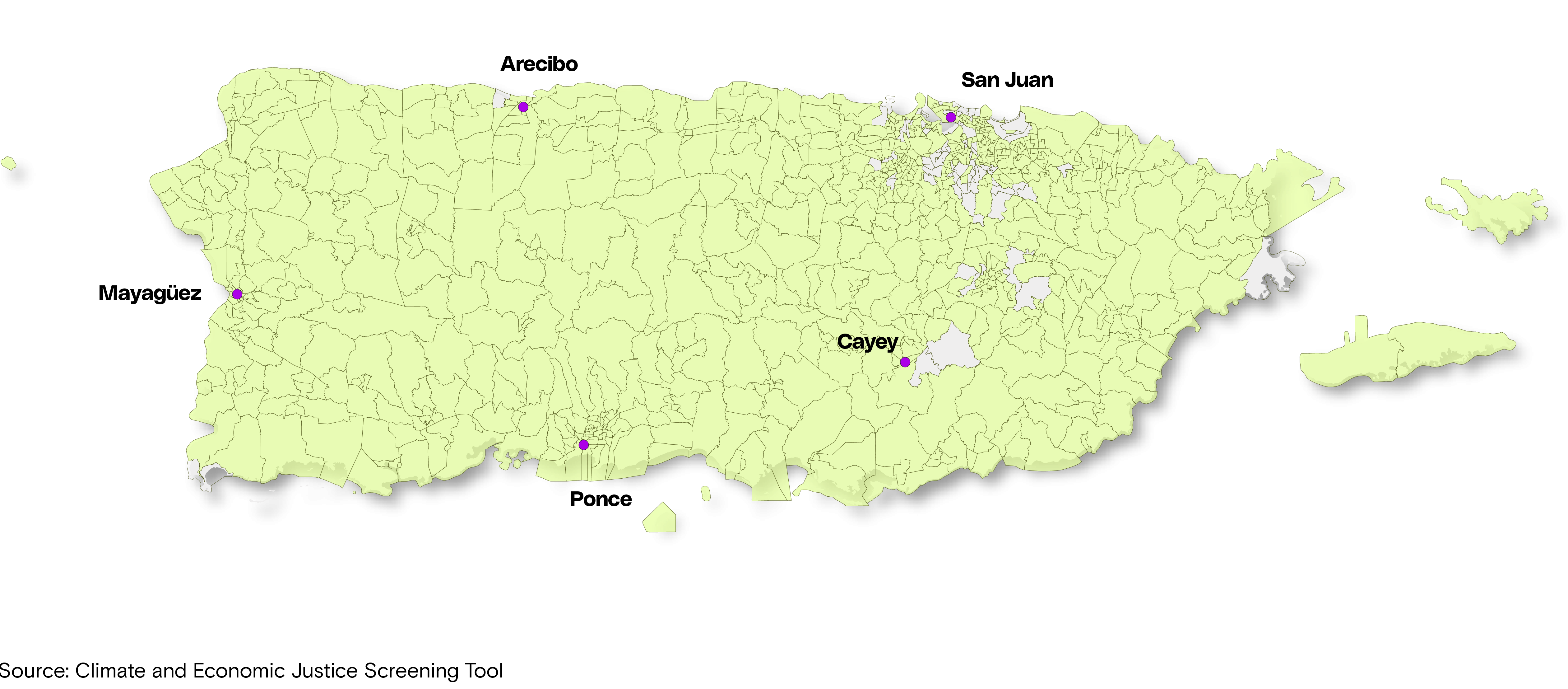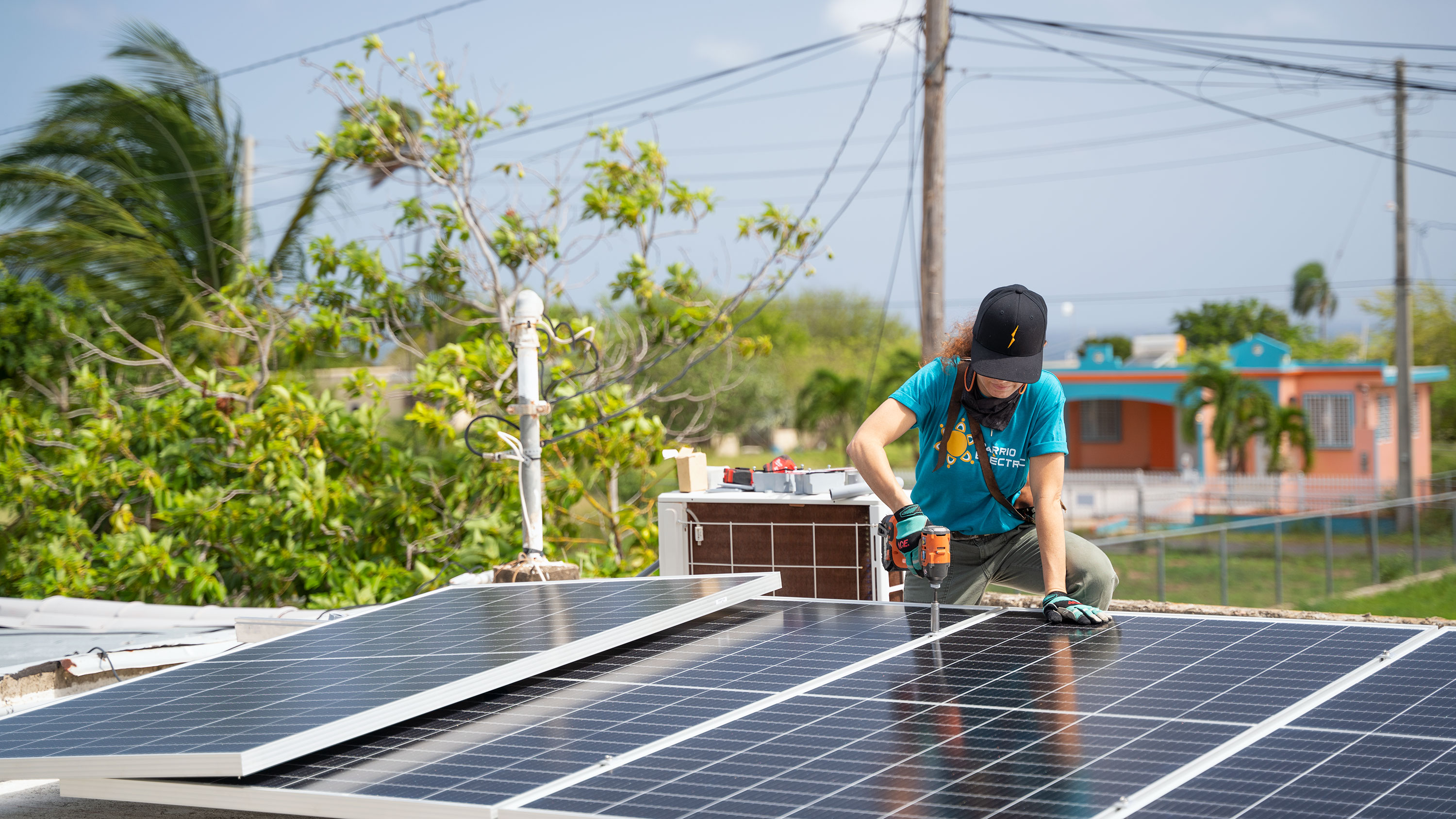Puerto Rico is in the midst of a residential-solar surge, one catalyzed by concerns over an unreliable grid, high energy prices, and destructive storms. In the six years since Hurricane Maria, solar installations have increased tenfold to more than 3,000 each month. Around 82,000 homes now use rooftop solar. Most of them include batteries, so when the power goes out, their systems keep working.
But this powerful means of energy resilience remains beyond reach for hundreds of thousands of Puerto Ricans. The systems are expensive, and most people use leases or loans to afford them. Those with low incomes or credit scores are excluded from traditional solar financing.
A new program from the Department of Energy’s Loan Programs Office takes aim at that problem. Last week, it finalized a $3 billion loan guarantee to Sunnova Energy, a residential solar company with nearly 350,000 customers in the United States and the largest operator in Puerto Rico.
It will back loans nationwide under Sunnova’s Project Hestia, which makes rooftop solar, battery storage, and demand-response software accessible to households in communities struggling with high energy bills, frequent outages, and climate risks. The agreement requires that at least 20 percent of the loans be issued to customers with credit scores of 680 or less, and that at least 10 percent, and up to 20 percent, of them be issued in Puerto Rico.
The program represents the federal government’s single largest commitment to solar energy and could help as many as 115,000 homeowners in the U.S. It also could prevent 7.1 million tons of CO2 emissions over the next 25 years.
The carveout for Puerto Rico is part of a sweeping effort by the Biden administration to bring clean, resilient energy to the U.S. territory as fast as possible, a commitment President Biden made last year after Hurricane Fiona, when the entire archipelago was again left without grid power. But while renewable-energy advocates agree rooftop solar is key to achieving energy independence in the archipelago, not all believe the loan guarantee is the best way to help low-income households.
Sunnova Energy has operated in Puerto Rico since 2013 and serves 60,000 customers there, accounting for 80 percent of the residential solar systems on the archipelago. It offers lease and loan financing with 25-year terms that include maintenance and repairs for the life of the agreement. Residents of Puerto Rico pay some of the highest electricity rates in the United States, and Sunnova customers there pay about 15 to 20 percent less than they would for electricity from the local utility, according to the company.
The loan-guarantee program is meant to deepen the pool of homeowners who can access financing. The median annual household income in Puerto Rico is under $22,000, 40 percent of residents live under the federal poverty line, and 40 percent do not have a credit card. Almost every census tract qualifies as a disadvantaged community under the Biden administration’s Climate and Economic Justice Screening Tool.

“It will allow Sunnova to reach a customer that it traditionally wouldn’t be able to reach,” said Michael Juarbe-Lafitte, the company’s senior manager of government affairs in Puerto Rico.
It is also meant to help lay the groundwork for what’s known as a virtual power plant, or VPP, which uses solar energy stored in home batteries to send power to the grid during peak demand. Since Hurricane Maria, essentially all home installations in Puerto Rico have included batteries, making it one of the places best positioned to harness this approach. All Project Hestia loans in Puerto Rico will include solar panels, home batteries, and energy management software.
Puerto Rico’s electric utility, Luma Energy, is weeks away from launching a Battery Emergency Demand Response Program, which will connect 6,000 home batteries to the grid to provide power during outages. The pilot program is meant to lead the way to a much larger expansion.
“If we could use those approximately 60,000 customers with energy stored in their batteries, we could easily replace some of these old dirty peaker plants during demand-response situations,” said Juarbe-Lafitte. “And those households will be compensated, which means money stays in Puerto Rican pockets.”
For all the benefits residential solar promises, some energy-resilience advocates say the long-term loans the Energy Department is bolstering isn’t the right model for low-income households.
Alejandra Castrodad-Rodríguez, the executive director of Resilient Power Puerto Rico, calls the Biden administration investments “transformational for Puerto Rico.” But she says organizations like hers, which advances community resilience through clean energy, want to see those investments underwrite community, not corporate, ownership of solar installations.
“The greater the local control over these climate assets, the more resilient the communities become,” she said.
That is best achieved, she said, by subsidizing loans with shorter terms to minimize the principal, so households own their systems sooner. That would further lower their energy bills. Loans also ought to be channeled through local credit unions and co-ops.
Marcel Castro-Sitiriche, a professor of electrical engineering at the University of Puerto Rico, Mayagüez, shared concerns about where the investments were being directed. “To provide a loan guarantee to a company that already has a large share of the solar rooftop market in Puerto Rico will provide a competitive advantage to Sunnova that could result in less competition and a deterioration of the service to customers,” he said. “We need to move in the opposite direction and incentivize local companies.”
Castrodad-Rodríguez is also wary of any model in which vulnerable low-income households, which in Puerto Rico can mean earning as little as $12,000 a year, take on debt. She wants to know what will happen to anyone who defaults on their payments, and worries that loan costs may become higher than market energy prices over the 25-year term.
“These government incentives are what make it possible to access these households, but then the government needs to establish necessary parameters to protect those households,” she said.
A Sunnova representative confirmed that if a Project Hestia customer failed to pay, the “normal collections process ensues as it does for any other customer,” but Dan DeSnyder, the company’s vice president of capital markets, said the company does not expect customers to default because their loan payments will be lower than their current utility bills, with higher reliability.
Sunnova’s reputation in Puerto Rico has taken a hit in the past. In 2017, the Independent Consumer Protection Office asked the Puerto Rico Energy Bureau, an oversight agency, to investigate the company after receiving 1,000 complaints about deceptive sales practices and poor repair service. Two years later, the bureau released a report criticizing Sunnova’s business practices, and in 2021, required Sunnova to improve its policies. Customers nationwide have submitted similar complaints to the Better Business Bureau, which currently gives the company an F rating.
Sunnova says it has taken aggressive steps to improve customer service. “As the largest residential solar and battery storage service company in Puerto Rico, we are proud of our history on the island and want to continue to provide clean, affordable, and reliable power services to more consumers on the island,” the company told Grist in an email. It opened a call center in Puerto Rico last April, promises a 24-hour response time on service requests, and plans to expand its service team from 16 employees to 75 by the year’s end.
The Department of Energy, or DOE, told Grist it did not want to comment on the agreement beyond what it stated in a blog post announcing the loan guarantee. There does appear to be some accountability built into the program: Sunnova will provide DOE with monthly reports on who receives loans, their FICO scores, income, locations, carbon-emissions savings, and more.
The DOE has also built consumer protection into some of its other energy programs in Puerto Rico. A $1 billion Puerto Rico Energy Resilience Fund meant to support rooftop-solar access for the medically vulnerable and those living in last-mile communities includes $5 million to 10 million for “consumer protection efforts.”
PJ Wilson, president of the Solar and Energy Storage Association in Puerto Rico, said the rate of consumer complaints on solar companies has dropped precipitously in recent years, to around 1 percent of new installs. “Compare that with the abysmal satisfaction rate of those same customers with the grid power,” he said, “which still has the most blackouts in all of the United States, by far.”
This story was originally published by Grist with the headline Energy Department backs solar loans for low-income Puerto Ricans on Oct 6, 2023.
This content originally appeared on Grist and was authored by Gabriela Aoun Angueira.
Gabriela Aoun Angueira | Radio Free (2023-10-06T21:47:45+00:00) Energy Department backs solar loans for low-income Puerto Ricans. Retrieved from https://grist.org/climate-energy/energy-department-sunnova-puerto-rico/
Please log in to upload a file.
There are no updates yet.
Click the Upload button above to add an update.
